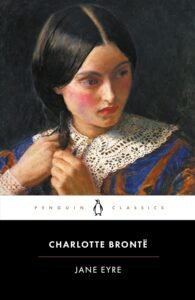“Jane Eyre” by Charlotte Brontë is a Gothic novel that follows the life of its titular character, Jane Eyre, from her difficult childhood as an orphan to her eventual marriage to the brooding Mr. Rochester. Set in Victorian England, the novel explores themes of class, sexuality, religion, and feminism, as Jane struggles to maintain her independence and sense of self in a world that seeks to suppress her.

Key Takeaways:
1. Independence and Self-Respect: Jane’s journey is one of self-discovery and empowerment, as she insists on maintaining her autonomy and self-respect, even when faced with love, poverty, and societal pressure.
2. Class and Social Hierarchies: The novel critiques the rigid class structures of Victorian society, highlighting the challenges faced by those who, like Jane, do not fit neatly into its categories.
3. Feminism: Jane Eyre is often considered a feminist work for its portrayal of a strong, independent female protagonist who challenges traditional gender roles and refuses to be subservient to men.
4. Morality and Religion: The novel grapples with complex questions of morality, particularly in relation to love and duty, and portrays different interpretations of Christian faith, from the harshness of Mr. Brocklehurst to the piety of Helen Burns.
5. Love and Sacrifice: Jane’s relationship with Mr. Rochester is central to the novel, exploring the tensions between passion and reason, and the sacrifices necessary for true love.






Discussion about this post